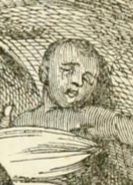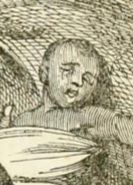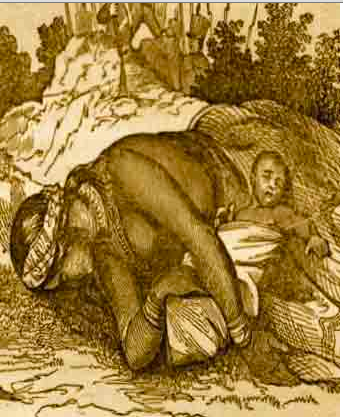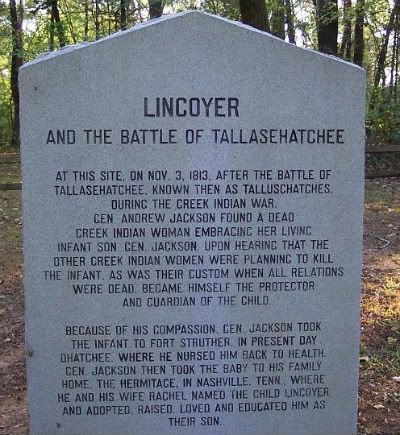A Creek Indian child found clutching the breast of his dead mother, he taken by General Andrew Jackson and sent home to The Hermitage. He was raised by the General and Mrs. Jackson. Jackson had hoped to send him to West Point to be educated but he died of tuberculosis, aged about 13. No explanation as to why a headstone was never erects to mark his grave.
Lyncoya Jackson
Nashville, Tenn. June 17
Died at the Hermitage on the morning of the 1st instant of a pulmonary complaint, and in the 16th year of his age, Lyncoya, the orphan son of a chief of the Creek Nation.
On the 3d of November, 1813, after the battle of Talulshatche was gained, an Indian child, about ten or twelve months old was found by an American soldier in the bloodiest part of the field, sucking at the breast of its dead mother, who had been killed, unfortunately, in action. The child was brought to General Jackson, who heart was immediately interested in its preservation. As many squaws had been taken and some of them had children at the breast, he applied to these to suckle it, offering a reward to anyone who would preserve it. They all refused saying that as its father and mother had been killed the best way would be to kill it also.
At that time the army was destitute of provisions and the only sustenance that could be got for the infant captive was made of a small quantity of brown sugar and the crumbs of biscuits scraped from the chinks of a barrel. These mixed in water, composed a diet which he seemed to relish and with the General and his faithful servant Charles kept him alive until an opportunity occurred for sending him to Huntsville.
The General then committed his foundling to the care Colonel Leroy Pope of that place, who was requested to take charge of him until he could be conveyed to Mrs. Jackson. Colonel Pope humanely received the little "Indian boy;" and his amiable daughter, Maria bestowed upon him the tenderest care. She gave him the name of Lyncoya and affectionately detained him at her father's until the close of the Creek war; when General Jackson on his return march to Tennessee took him home, delivered him to Mrs. Jackson and adopted him into his family.
In his first years he was feeble and sickly, a consequence probably of his want of a mother's care and nourishment; a want which nothing can supply. But after a time he became healthy and grew finely. At the age of five he began to discover an inclination for solitude and a turn for mechanical employments. At this age he made a bow fashioned after the manner of the Indians, the first of the kind that had ever been seen on the General's farm. This excited much surprise in the family as he had no intercourse whatever with Indians, except on one or two occasions when a few chiefs called to visit to take but slight notice of him. But whether from immediate instinct or from a predisposition to imitate Indian manners, he was in the habit of dressing his head with all the feathers he could pick up in the yard and amusing himself constantly with his little bow – differing in this particular from civilized children who change their amusements and toys with a sort of capricious variety.
At eight years of age the General sent him to a good day school in the neighborhood but he was very averse to learning and not even master of the alphabet in the course of a whole year. At 10, however, his intellectual faculties seemed to awaken. He became found of learning and advanced in it rapidly, giving evident signs of genius. The General then proposed having his education completed at West Point and securing him a station in the army; and had made know his wishes on the subject to President Monroe, who promised his countenance and favor.
But before Lyncoya's education was sufficiently advanced to give him admission at West Point, Mr. Adams and Mr. Clay came into power under circumstances which prevented any application for a warrant on the part of General Jackson. He therefore proposed to Lyncoya that he should indulge in his mechanical turn and learn some profitable trade. He said he preferred being a saddler, and in 1827, his English education being sufficient, he was bound to a saddler in Nashville.
During last winter he caught cold which fixed on his lungs and reduced him to such weakness that he got leave of absence and returned, as he said, "home," to the Hermitage. There he was treated with the greatest kindness and care. His diet was attended to – medical aid was called in and exercise in a carriage and on horseback afforded him. I have frequently seen him accompanying Mrs. Jackson in short excursions taken for his benefit and that amiable and benevolent lady, learning that Liverwort was esteemed salutary in consumptive cases, procured it and administered it to the Indian orphan.
But all was in vain; he declined with a progress daily visible and after very severe sufferings, which he bore with the uncomplaining fortitude of his race, expired under the roof of the hero who had conquered his nation, but who followed his remains to a decent grave and shed a tear as the earth closed over him forever. [Republican Compiler, Gettysburg, PA, August 20 1828]
A Creek Indian child found clutching the breast of his dead mother, he taken by General Andrew Jackson and sent home to The Hermitage. He was raised by the General and Mrs. Jackson. Jackson had hoped to send him to West Point to be educated but he died of tuberculosis, aged about 13. No explanation as to why a headstone was never erects to mark his grave.
Lyncoya Jackson
Nashville, Tenn. June 17
Died at the Hermitage on the morning of the 1st instant of a pulmonary complaint, and in the 16th year of his age, Lyncoya, the orphan son of a chief of the Creek Nation.
On the 3d of November, 1813, after the battle of Talulshatche was gained, an Indian child, about ten or twelve months old was found by an American soldier in the bloodiest part of the field, sucking at the breast of its dead mother, who had been killed, unfortunately, in action. The child was brought to General Jackson, who heart was immediately interested in its preservation. As many squaws had been taken and some of them had children at the breast, he applied to these to suckle it, offering a reward to anyone who would preserve it. They all refused saying that as its father and mother had been killed the best way would be to kill it also.
At that time the army was destitute of provisions and the only sustenance that could be got for the infant captive was made of a small quantity of brown sugar and the crumbs of biscuits scraped from the chinks of a barrel. These mixed in water, composed a diet which he seemed to relish and with the General and his faithful servant Charles kept him alive until an opportunity occurred for sending him to Huntsville.
The General then committed his foundling to the care Colonel Leroy Pope of that place, who was requested to take charge of him until he could be conveyed to Mrs. Jackson. Colonel Pope humanely received the little "Indian boy;" and his amiable daughter, Maria bestowed upon him the tenderest care. She gave him the name of Lyncoya and affectionately detained him at her father's until the close of the Creek war; when General Jackson on his return march to Tennessee took him home, delivered him to Mrs. Jackson and adopted him into his family.
In his first years he was feeble and sickly, a consequence probably of his want of a mother's care and nourishment; a want which nothing can supply. But after a time he became healthy and grew finely. At the age of five he began to discover an inclination for solitude and a turn for mechanical employments. At this age he made a bow fashioned after the manner of the Indians, the first of the kind that had ever been seen on the General's farm. This excited much surprise in the family as he had no intercourse whatever with Indians, except on one or two occasions when a few chiefs called to visit to take but slight notice of him. But whether from immediate instinct or from a predisposition to imitate Indian manners, he was in the habit of dressing his head with all the feathers he could pick up in the yard and amusing himself constantly with his little bow – differing in this particular from civilized children who change their amusements and toys with a sort of capricious variety.
At eight years of age the General sent him to a good day school in the neighborhood but he was very averse to learning and not even master of the alphabet in the course of a whole year. At 10, however, his intellectual faculties seemed to awaken. He became found of learning and advanced in it rapidly, giving evident signs of genius. The General then proposed having his education completed at West Point and securing him a station in the army; and had made know his wishes on the subject to President Monroe, who promised his countenance and favor.
But before Lyncoya's education was sufficiently advanced to give him admission at West Point, Mr. Adams and Mr. Clay came into power under circumstances which prevented any application for a warrant on the part of General Jackson. He therefore proposed to Lyncoya that he should indulge in his mechanical turn and learn some profitable trade. He said he preferred being a saddler, and in 1827, his English education being sufficient, he was bound to a saddler in Nashville.
During last winter he caught cold which fixed on his lungs and reduced him to such weakness that he got leave of absence and returned, as he said, "home," to the Hermitage. There he was treated with the greatest kindness and care. His diet was attended to – medical aid was called in and exercise in a carriage and on horseback afforded him. I have frequently seen him accompanying Mrs. Jackson in short excursions taken for his benefit and that amiable and benevolent lady, learning that Liverwort was esteemed salutary in consumptive cases, procured it and administered it to the Indian orphan.
But all was in vain; he declined with a progress daily visible and after very severe sufferings, which he bore with the uncomplaining fortitude of his race, expired under the roof of the hero who had conquered his nation, but who followed his remains to a decent grave and shed a tear as the earth closed over him forever. [Republican Compiler, Gettysburg, PA, August 20 1828]
Gravesite Details
Indian Creek Orphan
Family Members
Advertisement
Explore more
Sponsored by Ancestry
Advertisement







